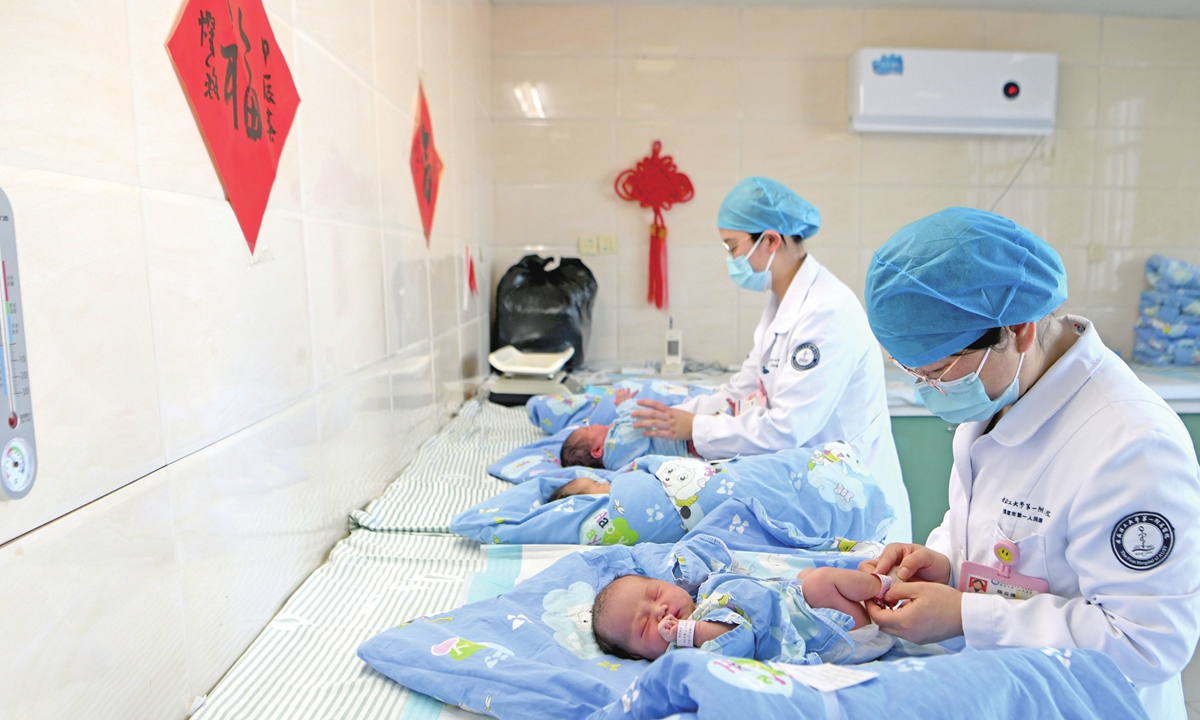
Nurses take care of dragon babies at the First Hospital of Anhui University of Science and Technology in Huainan, East China's Anhui Province, on February 16, 2024, the first day of the Year of the Dragon. Photo: VCG
Several regions across China have recently announced parenting subsidy policies, with some offering one-time subsidies as high as 30,000 yuan (about $4,147). They are part of the efforts to incentivize families to have more children and alleviate the financial strain associated with raising a family.
On Saturday, Bangjiangdong village in Guangzhou, South China's Guangdong Province, introduced an incentive scheme stipulating that villagers who have a second or third child will receive a certain amount of subsidy, with a reward of 10,000 yuan for the second child and 30,000 yuan for the third child. This incentive policy will officially take effect on June 1, Guangzhou Daily reported on Monday.
A village official told media that the scheme mainly takes into consideration the heavy pressures the younger generation is facing nowadays, with the increasing costs of raising a child and higher expectations for the quality of life. Therefore, the issuance of the policy aims to encourage young villagers to have more children, the official said.
Guangdong is the only province in China with a birth population exceeding 1 million for four consecutive years and the leading province in terms of fertility for six consecutive years, according to the latest data released by National Bureau of Statistics in April.
Holding the position of China's most populous province for 17 consecutive years, Guangdong has a permanent resident population of 127 million, with a birth rate of 8.12 per thousand in 2023.
Experts said the reason behind the high birthrate in Guangdong comes down to the strong economic strength and industrial foundation. In 2023, Guangdong's GDP reached 13.57 trillion yuan, with a growth rate of 4.8 percent, maintaining the top spot in the country's total GDP for 35 consecutive years.
Furthermore, Guangdong has frequently introduced measures to alleviate the concerns of raising a family among the reproductive-age population. In June 2023, Guangdong implemented 18 measures to enhance active support for raising a family, including adding over 330,000 public kindergarten spots, and increasing the housing provident fund loan amount for families with multiple children.
Hohhot, the capital city of North China's Inner Mongolia Autonomous Region, has also introduced parenting subsidies to families with more children, media reported on Monday.
Under the new incentive, taxpayers of the city will be able to deduct 2,000 yuan per month in expenses for caring for infants and young children under three years old. For families having a second or third child, they will be given a one-time subsidy of 5,000 yuan.
Also, a 98-day plus 2-month long maternity leave will be granted to families for the first and second child and an additional one month leave for the third. Dads will be given 25 days of paternity leave.
So far, several cities and provinces including Beijing, Guangdong, Zhejiang, Hunan, Jilin, Heilongjiang, among others have issued documents proposing the establishment of a childcare subsidy system. Some regions have also introduced targeted policies, such as preferential housing measures, the Xinhua News Agency reported.
"Less and less young people want to have children. This is due to a number of factors, including higher education which can impact plans to get married and have a family, the high cost of raising children in modern society and the weakening of traditional family culture. These trends have contributed to smaller family sizes and a shift toward delayed marriages and DINK households," Wang Peian, former deputy director of National Health and Family Planning Commission, told the Global Times.
To tackle this issue, Wang believes the key lies in establishing a comprehensive system of policies to support childbirth. He raised six aspects, including the improvement of economic support, childcare services, intergenerational care support, and reproductive health services.
Wang said he is optimistic about a slight increase in the number of births in China in 2024.
"In addition to people preferring to have a child during the Chinese Year of the Dragon, the phase-out of the COVID-19 pandemic, increase in the number of marriages, and optimization of fertility policies are also expected to have a positive influence on the birth rate," he said.




